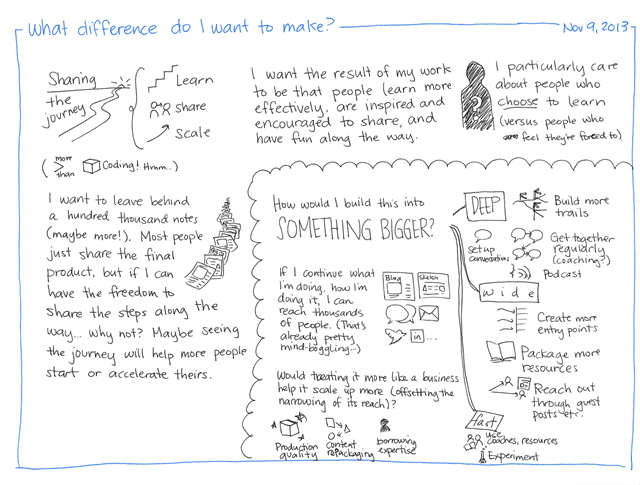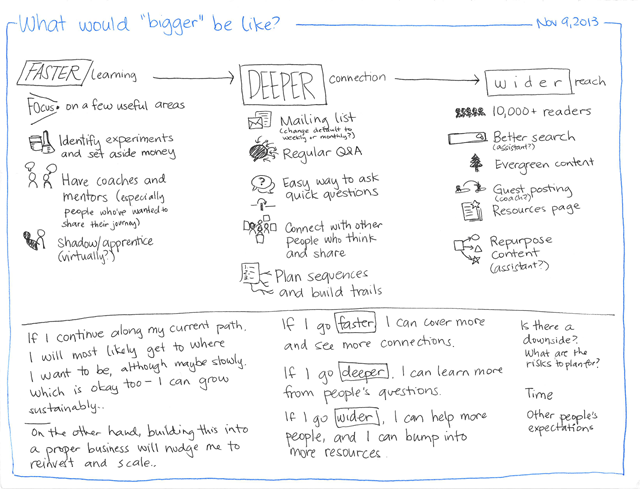Think about your delta: increasing the difference you want to make
Posted: - Modified: | learning, plansWhat kind of difference do you want to make? How can you make an even bigger difference?
I can’t remember where I picked up this idea—a book? a podcast?—but lately I’ve been thinking about my delta (D or d). In math and science, delta represents change. What kind of difference do I want to make in this world? Then I started thinking about calculus and derivatives, because that’s what delta reminds me of. How could I increase my rate of change? How could I accelerate? And then another order of derivatives: how can I increase the rate at which I increase my rate of change?
Here’s what I understand so far. I care about learning and sharing. I want to affect the way that people learn. I want to help them (I want to help you!) learn more effectively, be inspired, get encouraged to share, and have fun along the way. I’m doing just fine now, but there are many things I can learn or try that could help me make a bigger difference later on.
For example, let’s look at learning and sharing:
I was content with my progress before I started exploring this. Now I’m more excited about the possibilities. It’s a little scary – more opportunities to fall flat on my face! – but imagining what “bigger” would be like helps encourage me to go for it.
What do you want your delta to be? What could help you increase it?



6 comments
Paul D
2013-12-05T00:13:24ZAhem.... book. :-)
sachac
2013-12-08T10:25:01ZAhem... More questions! ;) I figure that the best way to pull a book out of my brain is to answer lots of people's questions and then organize the notes over time... =)
Paul D
2013-12-08T16:59:04Zheh he... seems like that first part is done! "6894 comments"... :-)
sachac
2013-12-08T23:32:53ZAlways room for more. =) I probably take lots of things for granted that might be useful for other people, and there are lots of things I can learn from others and document. =)
Raymond Zeitler
2013-12-05T15:05:41ZThere's the joke that a programmer is a machine that you put coffee into and you get out code. That's what the delta in this post reminds me of.
On one level, the delta might include that fact that humans are machines that convert O2 into CO2, water into urea, food into, er, you know. But humans' by-products are various and include all forms of arts, ideas, refined materials, physical structures and hopefully, care for the planet, its resources and the other life forms on it.
The second word in Paul D's comment comes to mind. This subject could lead to content of bookish proportion. It's certainly very thought-provoking!
Paul D
2013-12-13T18:05:52ZOne of the best books/audiobooks I have ever read/listened to is Richard Koch's "80/20" series of books.
He is a VC primarily, so much of what he talks about is the economics of 80/20, but it is applicable to many things, including how to learn more effectively. He suggests, for example, that you should rarely just begin a book, and read it cover to cover. He says that most of the value of books (or other media) can be extracted in a small fraction of the time it would take to read the whole thing. You have to cherry-pick the valuable parts.
Not sure if this is always applicable, particularly to fiction or "entertainment" reading. And Koch even presents counter-points to 80/20 that are along these lines; eg "The hamburger is the most important part, but you need the bun, pickles, ketchup, etc... or it really isn't a hamburger!"
I find that I am quite easily distracted by lifes trivia, and that I actually like complex problems & I will, given a choice, over-analyze & complicate things. I listen to Koch periodically to try to get grounded about "What" to do (effectiveness), instead of "How" to do things right (efficiency), as I tend to dwell on the latter despite the fact that it is dramatically less important than the former.